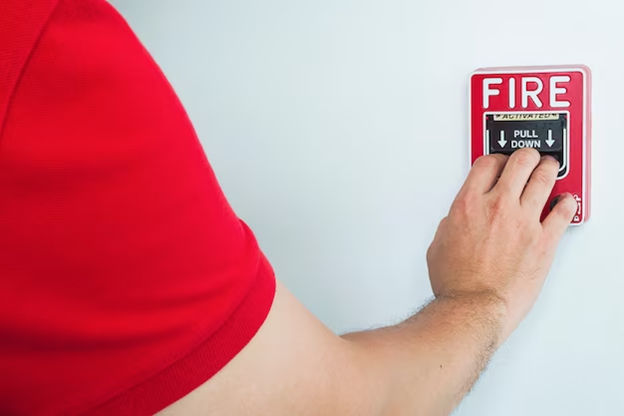Fire Alarm and Sprinkler Systems
A fire alarm is a warning device to help reduce loss of life and belongings in the event of a fire in a building. At PHILLY-TECH, students will learn about the two types of fire alarms, the manual initiating devices which are manual pull-down stations that can only be activated by hand and the automatic initiating devices which trigger automatically in the presence of fire.
PHILLY-TECH’s program includes the ionization, photoelectric, and combination alarms systems. In addition, PHILLY-TECH’s sprinkler program is based on the maintenance and the installation of sprinkler systems.
Throughout the program, students will also receive training in soft skills such as communication, teamwork, and leadership. The curriculum will be regularly updated to keep up with evolving fire protection technology and industry standards. Graduates of this program will be well-prepared for careers as fire alarm and sprinkler system technicians in residential, commercial, industrial, and manufacturing settings.

Diploma in Fire Alarm and Sprinkler System Technician Program
Duration: 1 to 2 years (4 to 8 Trimesters).
FPROT 100: Introduction to Fire Protection Systems
- Overview of fire protection systems and their importance
- Role and responsibilities of a fire alarm and sprinkler system technician
- Historical development of fire protection systems
FIRPROS 100: Occupational Safety in Fire Protection
- Workplace safety regulations and practices in fire protection.
- Personal protective equipment (PPE).
- Recognizing and preventing fire hazards.
FIRPCOM 100: Fire Protection Systems Components
- Identification and use of components in fire alarm and sprinkler systems.
- Wiring and controls in fire protection systems
- Safety procedures for working with fire protection systems.
FALAM 100: Fire Detection and Alarm Systems
- Types of fire detection systems (smoke detectors, heat detectors, etc.).
- Alarm notification and signaling devices.
- Alarm panel operation and testing.
RFALARM 100: Residential Fire Alarm Systems
- Design and installation of fire alarm systems in residential settings
- Testing and maintenance of residential fire alarm systems
- Codes and regulations for residential fire protection
RSPRIN 100: Residential Sprinkler Systems
- Installation and maintenance of residential sprinkler systems
- Hydraulic calculations for residential sprinkler systems
- Water supply and pumps for residential settings
FSINSP 100: Fire Safety Inspections
- Conducting fire safety inspections in residential properties
- Record-keeping and reporting
- Compliance with local and national regulations
EMERRE 100: Emergency Response and Evacuation
- Emergency response plans and procedures for residential buildings
- Evacuation drills and procedures
- Emergency communication systems
FPSINT 100: Fire Protection Systems Integration
- Integration of fire protection systems with building management systems
- Central monitoring and control of multiple systems
- Networking and communication protocols
FPSUPG 100: Fire Protection System Upgrades
- Upgrading older fire protection systems
- Modern technology and automation in fire protection
- Environmental considerations and regulations
FPINST 100: Fire Protection System Inspection and Testing
- Comprehensive inspections and testing of fire protection systems
- Record-keeping and reporting of inspection results
- Compliance with regulatory requirements
FASTES 100: Practical Training and Final Assessment
- Hands-on experience in residential, commercial, and industrial fire protection systems
- Final assessment and evaluation of practical skills
Successful completion of the program leads to the award of the Diploma in Fire Alarm and Sprinkler System Technician
Students have to contact the school administration if they want to take extra credits or transfer credits to pursue the Diploma Certificate or Associate of Applied Science (A.A.S.) Degree in their field of interest. Students will select required number courses in each of the areas listed to meet general education requirements graduation for the A.A.S. Some of these courses can be transferred directly from and to the university system and may be substituted for recommended courses on the outline. Students should speak with an advisor before doing so these selective courses are required for all students.
- Selected Communication Course (Choose two for Diploma or three for the Associate)
ENGL 100: Fundamentals of Speech
CPL 100: Career Planning
CPL 101: Communications and Career Strategies
ENGL 101: Composition
ENGL 102: composition
- Selected Mathematics Course (Choose two for Diploma or three for the Associate)
MATH 100:General Math
MATH 101:Intermediate Algebra
MATH 102:College Algebra
- Selected Social Science Course (Choose two for Diploma or four for the Associate)
ECON 105:Leadership
ECON 101:Principles of Microeconomics I
ECON 102:Principles of Macroeconomics II
SOC 101:Introduction to Sociology
PSYC 101: Introduction to Psychology
HIST 101: History
